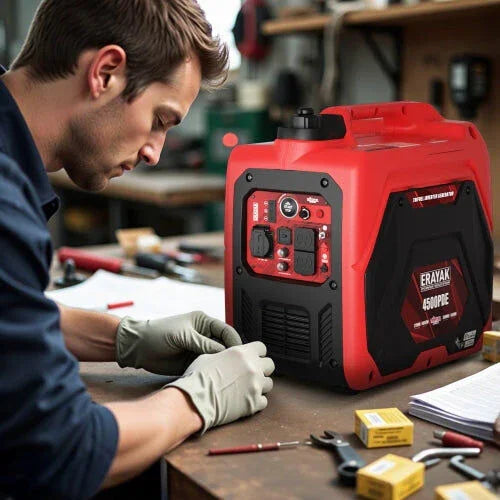The Importance of Reliable Power
In today's world, having a reliable power source is no longer a luxury but a necessity. Whether you're a tech-savvy homeowner, an eco-conscious product developer, or a consumer electronics retailer, understanding the nuances of emergency generator maintenance can be a game-changer. With the right knowledge, you can ensure that your generator remains a steadfast ally during power outages, providing seamless integration with your power needs. In this article, we will delve into essential tips and tricks for maintaining your emergency generator, emphasizing reliability, convenience, and environmental considerations.
Understanding Emergency Generators
Emergency generators are backup power systems designed to supply electricity during outages. They are indispensable for maintaining functionality in homes and businesses when the main power grid fails. There are several types of generators, including:
- Portable Generators: Ideal for temporary use, they are easily movable and perfect for small homes or outdoor activities.
- Standby Generators: Permanently installed, these provide an automatic power backup, often used in larger homes or businesses.
- Inverter Generators: Known for their efficient fuel consumption and quiet operation, these are suitable for sensitive electronics.
Why Maintenance Matters
Like any other piece of machinery, generators require regular upkeep to function optimally. Neglecting maintenance can lead to performance issues or complete failure during critical moments. Here are some reasons why maintenance is essential:
- Reliability: Routine checks ensure that your generator is ready to operate whenever needed.
- Efficiency: Well-maintained generators consume less fuel, saving costs and reducing environmental impact.
- Longevity: Regular maintenance extends the life of your generator, providing better returns on your investment.
Routine Inspection Checklist
Conduct thorough inspections to identify any signs of wear and tear. Focus on checking:
- Oil Levels: Low oil can cause engine damage. Check and change the oil regularly, following the manufacturer's guidelines.
- Air Filters: Clean or replace air filters to prevent dust and debris from affecting engine performance.
- Spark Plugs: Examine spark plugs for wear and replace them as needed to ensure smooth operation.
Battery and Electrical System Care
A generator's battery is crucial for starting the engine. Ensure that the battery is fully charged and free from corrosion. Regularly test the electrical system to confirm that all connections are secure and functional.
Fuel System Maintenance
- Fuel Quality: Use high-quality fuel and stabilize it if the generator is not used frequently to prevent degradation.
- Fuel Lines and Filters: Inspect for leaks or blockages and replace filters periodically to maintain fuel flow.
Testing Generator Performance
Perform load tests periodically to ensure your generator can handle the electrical demand during an outage. This test helps in identifying potential issues that may arise under load conditions.
Smart Technology Integration
Integrating smart technology with your generator can offer real-time monitoring and alerts for maintenance needs. This proactive approach helps in addressing issues before they escalate, ensuring uninterrupted power supply.
Sustainable Maintenance Practices
For eco-conscious users, consider implementing sustainable practices such as:
- Biodegradable Oil: Use environmentally-friendly oils that reduce pollution.
- Solar Backup: Incorporate solar panels to supplement generator power, reducing fuel consumption and emissions.
Troubleshooting Common Problems
Even with meticulous maintenance, issues can arise. Here’s how to tackle some common problems:
- Generator Won't Start: Check the battery charge, fuel levels, and oil. Ensure all connections are secure.
- Low Power Output: Inspect the load capacity and ensure the generator is not overloaded. Check for blockages in the fuel system.
- Unusual Noises: Listen for any unusual sounds during operation. These may indicate mechanical issues that require professional attention.
Conclusion: Reliability Through Maintenance
Maintaining an emergency generator is crucial for ensuring its reliability and efficiency. By following the tips and tricks outlined in this article, tech-savvy homeowners can enjoy seamless power integration, eco-conscious developers can enhance product sustainability, and retailers can better educate their customers. Remember, a well-maintained generator not only provides peace of mind during outages but also contributes to a more sustainable future.
Invest in regular maintenance, embrace smart technologies, and prioritize eco-friendly practices to maximize your generator's potential. With these strategies, you can ensure that your power needs are met with reliability, convenience, and minimal environmental impact. Whether you're preparing for the next storm or integrating cutting-edge power solutions into your home, these maintenance tips will keep your generator running smoothly when you need it most.







